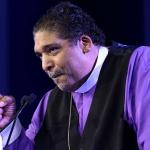The Adventurous Lectionary – Second Sunday in Lent (March 4, 2012)
Readings: Genesis 17:1-7; Psalm 22:23-31; Romans 4:13-25; Mark 8:31-38
Today’s scriptures join sacrifice, simplicity, and solidarity. The solidarity of revelation – which is always energetic and supportive as well as illuminating – enables us to let goof our egos and our claims on the many commodities of life including truth,time, and possessions. In a world in which revelation and inspiration are scarce and limited to a select group, sacrificeand simplicity go against human nature. But, if God is generous, then we can be generous as well as self-forgetful, motivated by the awareness that God is moving in our lives andencounters, not arbitrarily or begrudgingly, but consistently and gracefully. Losing ourselves opens us to the greater energies of creation, rather than impoverishing our experience.
Genesis 17 describes an everlasting covenant between God and humankind. Although Abram – now Abraham – appears to bethe recipient of this covenant, he is one link in a chain of covental encounters: God’s graceful gifts to him and his offspring reflect God’s earlier covenant with creation itself in all its diversity. The mythical flood and human rebellion did not nullify God’s affirmation of the goodness of creation and God’s care for humankind. God’s ways may change in changing circumstances and in response to our actions, but God’s overall care is “everlasting” – that is, unbroken from the birth of the universe until its ultimate transformation in God’s dynamic realm of experience (the realm of God,the realm of Shalom). God’s covenantwith Abraham is for all not just a few: Abraham is promised a blessing for “a multitude
of nations,” that is, the whole earth.
Paul’s words in Romans 4 continue the theme of covenant. God’s covenant is not the result of human effort or following external laws, however helpful and well-intended. In some ways, the “law,” the orderly patterns of the universe precede all our efforts. Though codified and carrying both promise and threat, the best of our laws is a temporary reflection of God’s wisdom embedded in the creative process. The creative process from which both grace and law emerge is grounded in theongoing interplay of freedom and chance, chaos and order, surprise and predictability.
Creation and grace are continuous and eternally joined. They can’t be dissolved by human faithlessness or created by human goodness. Rather, faith is accepting God’s graciousness in Christ and in the many manifestations of Christ that call us forth on a day to day basis. Faith opens us to new possibilities and energies, and enables us – like Abraham and Sarah – to be fruitful despite our age or previous lifestyle.
I do not think Paul intends faith to be wholly passive and one directional. To some extent, the Reformers in their response to “works righteousness” made faith an all or nothing proposition in which any human effort is an affront to God. But this is surely not the intent of the apostle Paul who asserted: “work out your salvation with fear andtrembling, for it is God who is at work in you, enabling you both to will and to work for God’s good pleasure.” (Philippians 2:12-13)
Our faith here is a lively reckless confidence in the grace of God, as Luther says; it is also a willingness to align our will with God’s will so that we might be vehicles of God’s healing energy in the world. Our faith, as Jesus asserts, can be the tipping point between health and illness. God does not stand in the wayof our freedom, but inspires greater freedom and creativity among creatures. Our creativity, accordingly, enables the non-competitive God to become more active in the world.
Recently, a presidential candidate proclaimed the significance of human dominion over the earth. According to Rick Santorum: “We were put on this Earth as creatures of God to have dominion over the Earth, to use it wisely and stewardit wisely, but for our benefit not for the Earth’s benefit…..We are theintelligent beings that know how to manage things and through the course of science and discovery if we can be better stewards of this environment, then we should not let the vagaries of nature destroy what we have helped create.” Such a viewpoint is unbiblical and contrasts with the creation t theology of Genesis 1:1-2:4a, Genesis 2:4b-25, and the theology of Psalm 22: “dominion belongs to God.” Sadly, if we do not take into considerationthe Earth’s benefit, we are turning away from God’s vision, and will eventually destroy ourselves along with the non-human environment.
Unwillingness to recognize our role in global climate change is often theologically motivated – the future is entirely in God’s hands and only God can end human life – but the theology is destructive and demoralizing and leads to complacency about the fate of the Earth. A much healthier theology affirms a divine-human synergy, in which our alignment with God’s vision, enables us to be God’s partners in healing the earth. [http://nativestrength.com/2012/02/17/rick-santorums-quotes-on-mans-dominion-over-nature-the-crusades-and-christendom/]
Jesus’ words from Mark 8 join suffering and simplicity. “Life is suffering” asserts Gautama the Buddha, and this suffering is grounded in holding onto to the finite, self-interested self, rather than opening to the Great Self. Jesus would agree. Suffering is real and the possibility of death in Jerusalem lies on the horizon. But, Jesus is willing to take up his cross as a result of his faith in and relationship to a loving and generous Parent, whose love inspires the stars, the lilies, the birds, and human life.
Jesus’ followers must also take up their cross. This is not counsel for Christians to chase lions in their quest for martyrdom or buy tickets for the via dolorosa. There will be suffering enough without us seeking it. In fact, God’s aim at abundant life calls us to eliminate as much needless suffering as possible – both human and non-human. But, taking up our cross inspires us to sacrifice on behalf of a greater good – whether for our children and grandchildren, other peoples’ children, non-human species, and the most vulnerable people in our world.
“Those who save their life will lose it, and those who lose their life for my sake, and the sake of the Gospel, willsave it.” Many gain the world but thosetheir souls: their consumerism, quest for profit, injustice to the poor, fattens their pocket books but contracts their spirits.
Losing our lives means simplifying our lives, discovering that we can live on less, take internet holidays, give up instant gratification so that others may simply live. When we open ourselves to God’s vision, our souls become large – of great stature – in their ability to embrace the widest realities possible. We identify ourwell-being with the well-being of others and our willing to let of possessiveness for the greater good.
Having lost the self-protective self and identified with God’s all-inclusive Self, we become reflections of the spirit of Christ: mahatmas, great souled ones, bodhisattvas, and little Christs, whose peace radiates across our world to be a blessing to all.
Bruce Epperly is a theologian, spiritual guide, pastor, and author of twenty two books, including Process Theology: AGuide to the Perplexed, Holy Adventure: 41 Days of Audacious Living, Philippians: An Interactive Bible Study,and The Center is Everywhere: Celtic Spirituality for the Postmodern Age. His most recent text is Emerging Process: Adventurous Theology for a Missional Church.
He may be reached at drbruceepperly@aol.com for lectures,workshops, sermons, and retreats.















